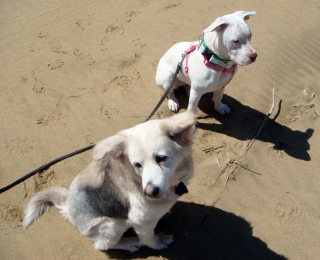A Balancing Act

Lately, I have heard many people toss around the phrase “balanced trainer”. Some of the people behind this phrase incorporate both reward-based and aversion-based methods to train dogs. Many use reward-based training with puppies, but are heavy handed and forceful with adult dogs – as if the emotional needs of each are different even though they are both dogs. I disagree with this definition of a ‘balanced trainer’. You cannot have your cake and eat it too –there is no balance in choking an adult GSD during one session followed by using lure-reward training with a 12 week old beagle. The entire picture of your philosophy is in question here. To say you are “balanced” after that is just an act of illusion. Either you are a positive, reward-based trainer or you aren’t.
To me, a ‘balanced trainer’ is actually one that incorporates the many methods of humane, scientifically-based dog training along with a boatload of empathy for both the dog and the owner. It is extremely difficult to feel immense empathy for a suffering dog and still be able to function in the way that is needed in order to help rehabilitate the dog and the owner. As a dog owner and trainer, I struggle with feeling sorry for my reactive ACD while utilizing my training education in order to help him during those moments where he seems to be drowning. The balance needed is not as easy as it appears to be in theory.
Let’s not beat around the bush -- the application of something unpleasant for a dog that he will work to avoid is an aversive. Included in this list are things like water spray bottles, citronella collars, the infamous bitter apple spray, along with the other usual suspects involving pain, choke, shock, and startle. Many will argue the semantics of what constitutes hurting a dog, bringing forth the old “high pain tolerance” and old-school “dogs are just animals” justifications. True, they are animals, but so are we and pain tolerance is really an irrelevant point. What about being JUST in the grand scheme of things and doing right by the emotions of the dog?
I have also read (and reread)a few opinion-based articles trashing positive, reward-based trainers while portraying them in the same light as Desperate Housewives tossing cookies. Pot-shots negating their gender, experience, knowledge of other methods, and dog ownership were among the listed traits of these “weak” professionals. I, for one, do not believe for an instant that competing in agility, walking my dog on a harness, or focusing on puppy classes makes anyone a weaker or lesser dog trainer than another. Everyone has a forte, be it aggressive dogs, new puppy classes, or housetraining issues. I don’t know of any positive, reward-based trainer that isn’t acutely aware of the use and effect of aversive equipment, either. To say we “do not understand” or are “ignorant” of these tools and methods is to point one finger at us and four back at oneself. We have done the research and voted in favor of using safe, humane techniques that are fun and effective for both dog and owner.
I had the pleasure of meeting a dog trainer a few months ago at a seminar who almost solely takes housetraining clients and has overflowing amounts of business offering board and train for these dogs in her home. How genius is that??? I think she may even be a BETTER dog trainer for her bulls-eye focus on her strengths. She is also obviously a fantastic marketing and businesswoman.
So, regardless of whether you wrestle aggression cases or play with puppies all day, if you are choking, startling, shocking, tapping or otherwise causing physical discomfort or mental anguish to any dog in the name of training do not, by any means, call yourself "balanced". Own up to what you do and save the term “balanced” for those of us who truly are.




